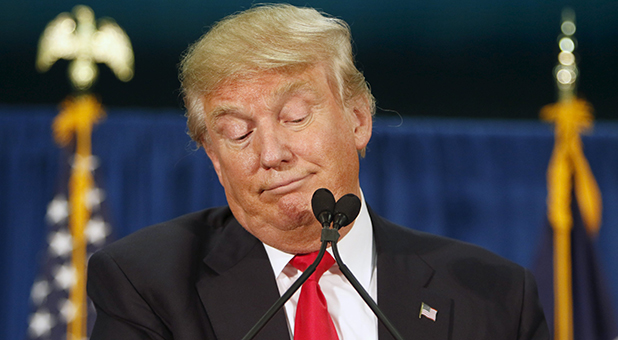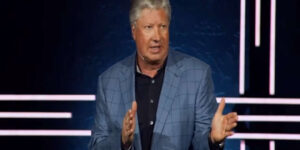Donald Trump Still Liked by GOP Voters Despite Not Being Seen as ‘Religious’
Can the least religious candidate somehow become president of the United States? Traditional conventional wisdom says that’s not likely, but a new survey released by Pew Research Center says it’s at least a possibility in 2016.
The Pew survey found that while Republican front-runner Donald Trump is widely viewed by Republican voters as a potentially “good” or “great” president, he’s also widely seen as a not-very-religious person. Just 30 percent of U.S. adults, according to the study, view him as a religious person.
The poll found roughly two-thirds of adults—68 percent—think Ben Carson is “very” or “somewhat” religious. Ted Cruz came in a close second at 65 percent, while Marco Rubio placed third at 61 percent. The Pew data suggests other candidates, such as Mike Huckabee and Rick Santorum, were not among those that voters were asked about.
Democrat candidates Hillary Clinton and Bernie Sanders did not fare as well as the other Republican candidates, but did do better than Trump. Clinton was viewed as religious by 48 percent of those surveyed, while Sanders was seen as a religious person by 40 percent of those polled.
Does it matter? The Pew data suggests it might.
“The new survey confirms that being an atheist continues to be one of the biggest perceived shortcomings a hypothetical presidential candidate could have, with 51 percent of adults indicating they would be less likely to vote for a presidential candidate who does not believe in God,” the report states. “The study also shows that having a president who shares their religious beliefs is important to many Americans, with about half of U.S. adults saying it is ‘very important’ (27 percent) or ‘somewhat important’ (24 percent) to have someone in the White House who shares their religious perspective. This view is particularly common with Republicans, among whom 64 percent say it is at least ‘somewhat important’ to them that the president share their religious beliefs.”
But … the study also showed many Republicans think Trump would be a good president despite his perceived lack of religiosity. That could be, however, a case of perception.
Of the 56 percent of GOP voters who think Trump would be a good or great president, only 17 percent think he is not religious. For the other leading Republican candidates, the data is very different.
“[V]irtually all Republicans who think Cruz, Rubio and Carson would be successful presidents (and who express a view about their religiousness) also say they view those candidates as at least somewhat religious,” the report states. “Just 2 percent of GOP voters think Rubio would be a good president and that he is not particularly religious, with just 1 percent saying the same about Cruz and Carson.”
The Pew data also knocks a hole into one of the leading arguments against a Trump candidacy. More than half—52 percent—of white evangelical Protestant voters, regardless of party affiliation, think Trump would make a “good” or a “great” president. They expressed a similar degree of confidence in Carson and Cruz, but were less convinced about the other Republican candidates. Evangelical voters overwhelmingly rejected the notion that Sanders or Clinton would make good presidents. Sanders edged out Clinton in that regard, 16 to 15 percent. Black Protestants and “religiously unaffiliated” voters, however, had a different view.
“Fully half of religiously unaffiliated registered voters (51 percent) think Sanders would be a successful president, while 42 percent think Clinton would be a good or great president,” the report states. “Among black Protestant voters, 62 percent think Clinton would be a good or a great president, while 36 percent say this about Sanders. Among both groups, just 15 percent or fewer think any of the Republican candidates would be good presidents.”
The Pew data suggests more than two-thirds of Americans believe religion is losing its influence on American society. Most of those who do said it is bad for the nation as a whole. The survey also indicated that 40 percent of Americans think there has been too little expression of religious faith and prayer by political leaders, while 27 percent said there has been too much.






































